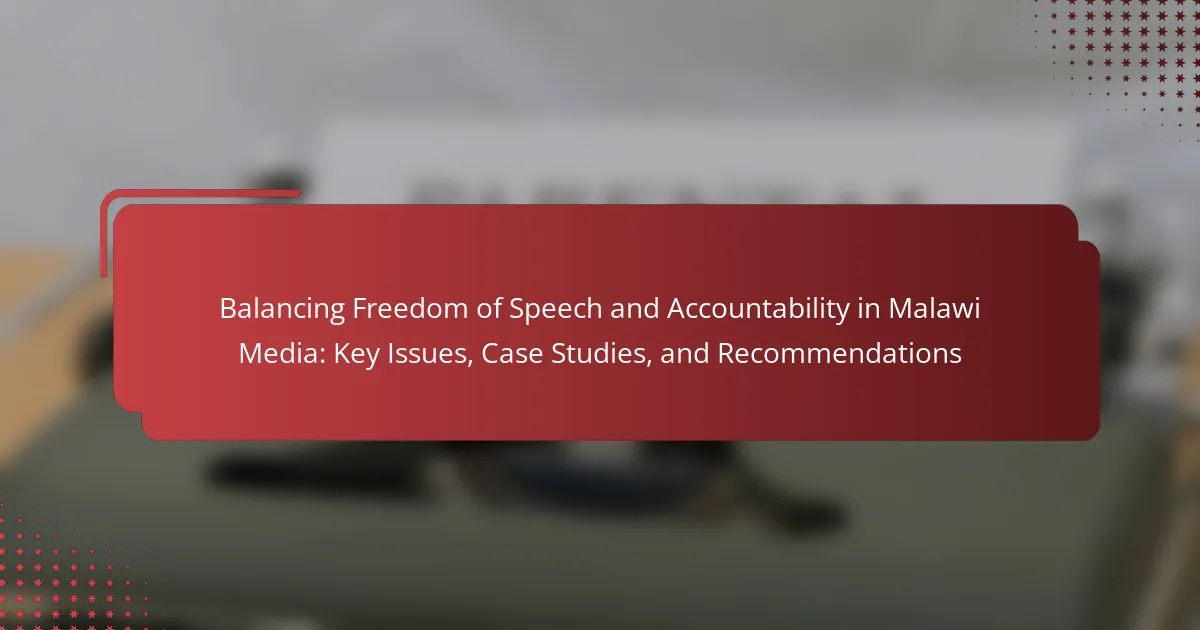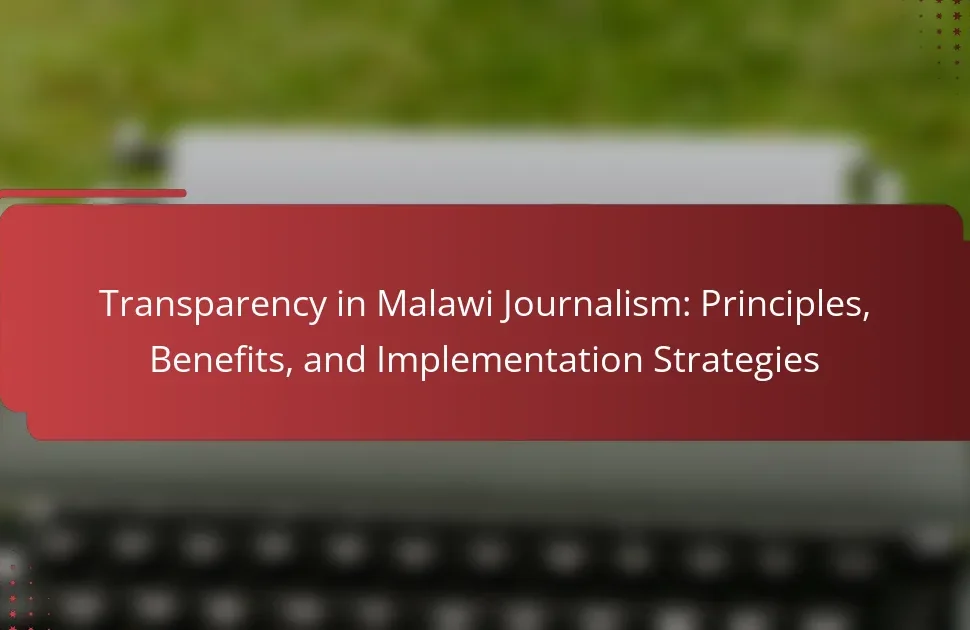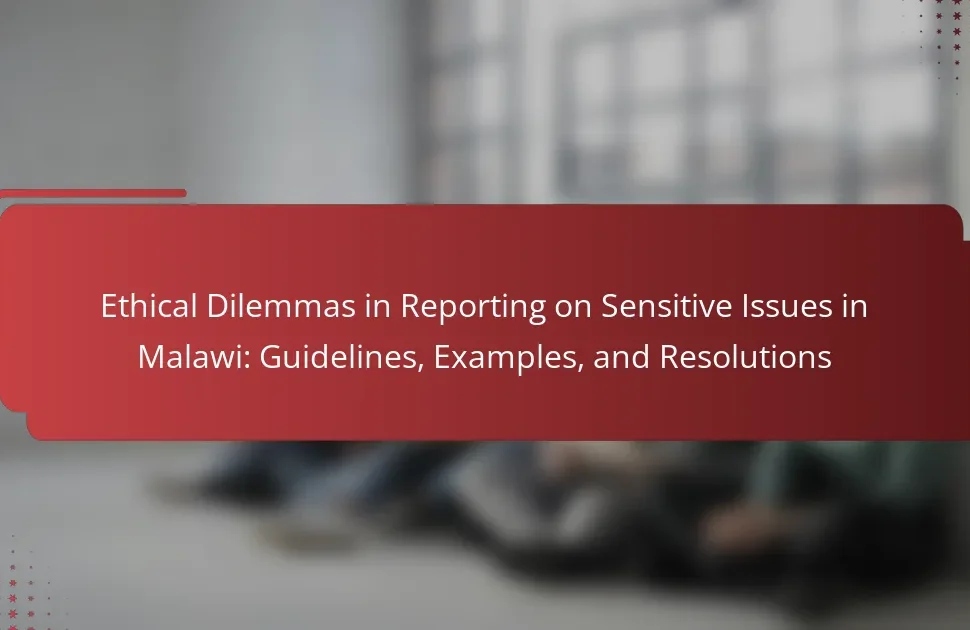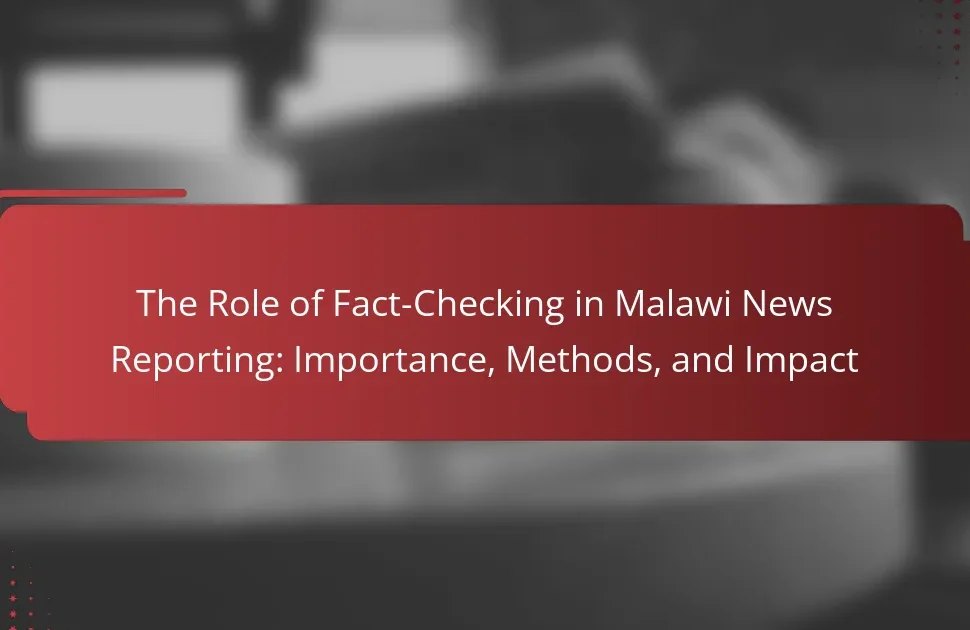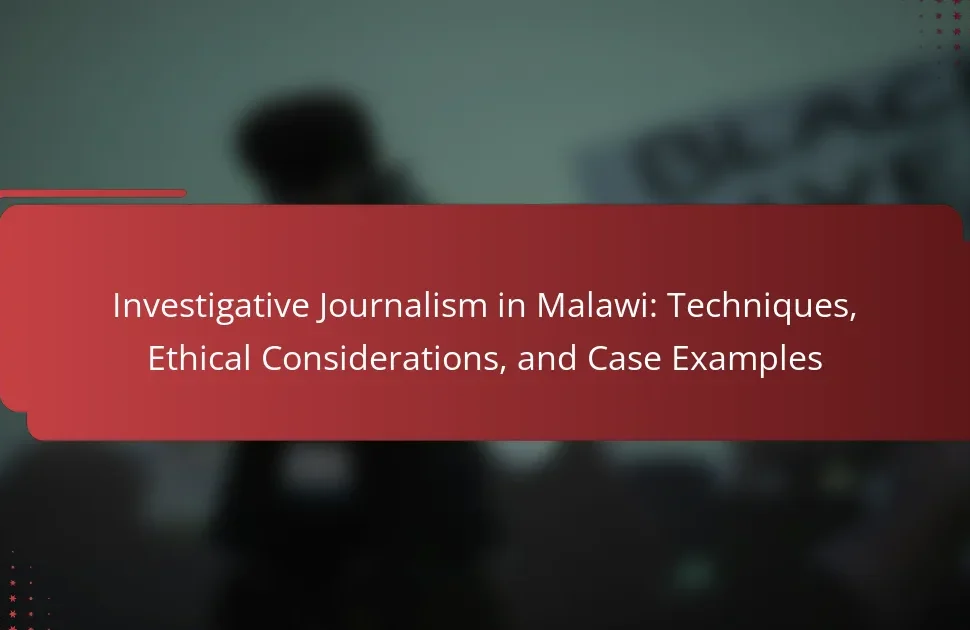The article examines the critical issues surrounding freedom of speech and accountability in the media landscape of Malawi. Key concerns include government censorship, inadequate legal protections for journalists, and political interference that undermines media independence. It highlights notable case studies, such as the 2019 presidential election coverage and the arrest of journalist Gregory Gondwe, which illustrate the challenges faced by media professionals. The article also presents recommendations for establishing clear legal frameworks, promoting media literacy, and fostering dialogue between media and government to enhance accountability while safeguarding free expression.
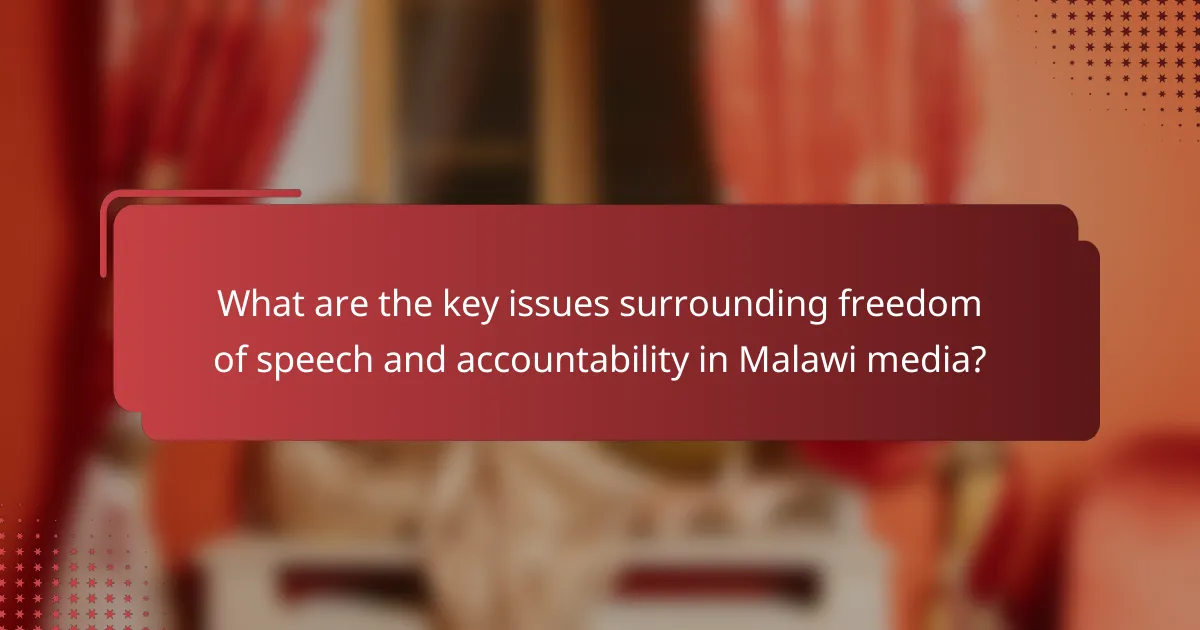
What are the key issues surrounding freedom of speech and accountability in Malawi media?
Key issues surrounding freedom of speech and accountability in Malawi media include government censorship, lack of legal protection for journalists, and political interference. Government censorship often limits the dissemination of critical information. Journalists face threats and harassment, which stifles their ability to report freely. The legal framework in Malawi does not adequately protect media workers from defamation laws. Additionally, political interference compromises the independence of media outlets. Reports indicate that government officials sometimes intimidate journalists to suppress dissenting voices. This creates a climate of fear that affects the quality of news coverage. As a result, accountability in reporting is severely hampered.
How do cultural and political contexts influence media freedom in Malawi?
Cultural and political contexts significantly influence media freedom in Malawi. The political landscape, characterized by a history of authoritarian rule, often leads to government control over media outlets. This results in censorship and restrictions on journalists. Cultural factors also play a role, as traditional beliefs may prioritize community harmony over individual expression. Additionally, societal norms can sometimes discourage critical reporting on political leaders. The 2018 Media Council of Malawi report highlights these challenges, noting increased intimidation of journalists. Furthermore, the 2020 protests against the government demonstrated the tension between media freedom and political repression. Overall, both cultural and political elements create a complex environment for media operations in Malawi.
What historical events have shaped the current media landscape in Malawi?
The current media landscape in Malawi has been shaped by several historical events. The introduction of multiparty democracy in 1994 allowed for greater press freedom. This shift ended decades of state-controlled media under President Hastings Banda. The 2000s saw the emergence of private radio stations and newspapers. These outlets provided diverse viewpoints and challenged government narratives. However, media freedom faced setbacks during periods of political tension. For instance, the 2011 protests led to increased government scrutiny of journalists. Additionally, the 2019 elections highlighted ongoing challenges related to media bias and censorship. Overall, these events have significantly influenced the development and operation of media in Malawi.
How do government policies affect media operations in Malawi?
Government policies significantly influence media operations in Malawi. These policies can dictate the regulatory framework within which media outlets function. For instance, laws regarding media licensing can restrict the number of broadcasters. The Malawi Communications Regulatory Authority oversees the licensing process, impacting competition in the media landscape.
Additionally, government policies can impose restrictions on content. Laws against defamation and sedition can lead to self-censorship among journalists. This often results in limited coverage of critical issues affecting society. Furthermore, financial support or penalties from the government can directly affect media sustainability.
In 2016, the Media Institute of Southern Africa reported increased government pressure on journalists. This illustrates the tension between media freedom and governmental control. Overall, government policies shape the operational environment for media in Malawi, influencing both freedom of expression and accountability.
What role do journalists play in balancing freedom of speech and accountability?
Journalists play a crucial role in balancing freedom of speech and accountability. They provide a platform for diverse voices and opinions, ensuring that all perspectives are heard. This fosters an open dialogue in society. At the same time, journalists hold those in power accountable. They investigate and report on issues of public interest, exposing corruption and abuse. For example, investigative journalism in Malawi has revealed government malfeasance, prompting public discourse and reforms. By doing so, journalists uphold the principles of free expression while ensuring responsible reporting. This dual function is essential for a healthy democracy.
What challenges do journalists face in reporting on sensitive issues?
Journalists face numerous challenges when reporting on sensitive issues. These challenges include threats to personal safety, legal repercussions, and censorship. In politically unstable regions, journalists may encounter violence or intimidation. Legal frameworks can restrict freedom of expression, leading to arrests or lawsuits against reporters. Censorship from government or corporate entities often limits access to information. Additionally, journalists may struggle with ethical dilemmas regarding privacy and the impact of their reporting. According to a 2021 report by the Committee to Protect Journalists, over 200 journalists worldwide were jailed for their work, highlighting the risks involved in covering sensitive topics.
How does self-censorship impact media accountability in Malawi?
Self-censorship significantly undermines media accountability in Malawi. Media professionals often refrain from reporting critical issues due to fear of repercussions. This leads to a lack of transparency in governance and public affairs. Consequently, self-censorship diminishes the media’s role as a watchdog. For instance, journalists may avoid covering corruption or human rights violations. This avoidance prevents the public from being informed about important societal issues. Studies indicate that self-censorship is prevalent among Malawian journalists. Reports show that 65% of journalists have self-censored due to fear of government backlash. Such practices erode public trust in media institutions. Ultimately, self-censorship creates an environment where accountability is compromised.
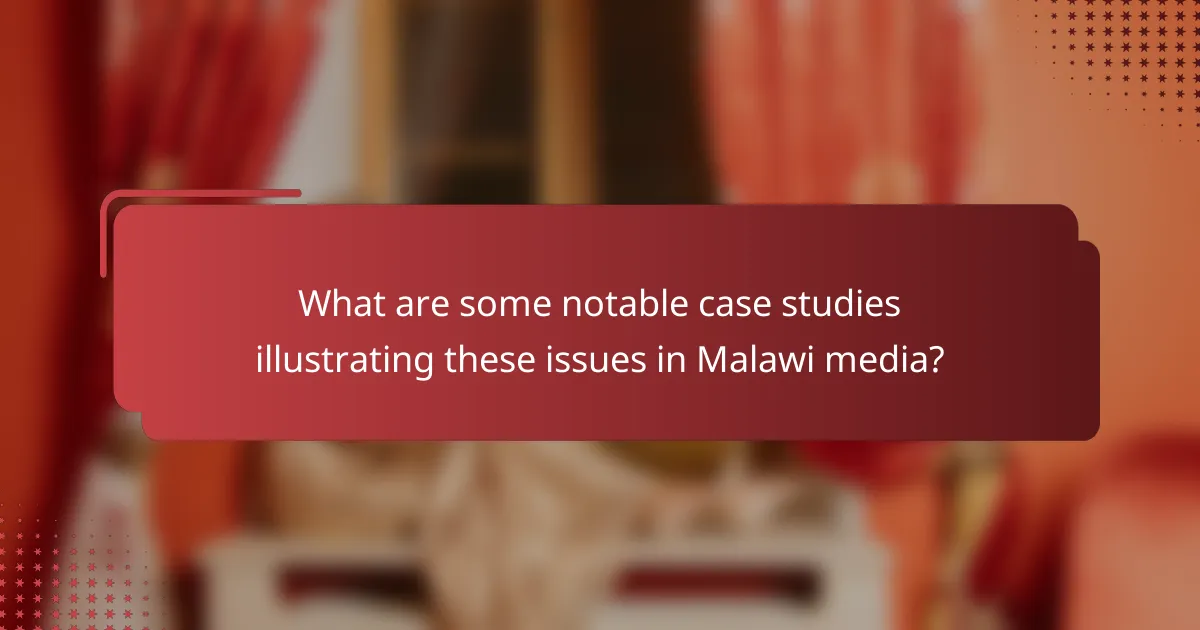
What are some notable case studies illustrating these issues in Malawi media?
Notable case studies illustrating issues in Malawi media include the 2019 presidential election coverage. Media faced challenges in reporting on electoral irregularities. Journalists were pressured to conform to government narratives. The case of the Malawi Electoral Commission’s disputes highlights media’s struggle for independence. Another significant case is the arrest of journalist Gregory Gondwe in 2020. He was detained for reporting on corruption allegations involving high-ranking officials. These instances underscore the tension between freedom of speech and accountability in Malawi’s media landscape.
Which incidents highlight the tension between freedom of speech and accountability?
Incidents that highlight the tension between freedom of speech and accountability include the 2011 anti-government protests in Malawi. During these protests, media outlets faced government pressure to limit coverage. In 2016, the arrest of journalist Gregory Gondwe for publishing a critical article further exemplified this conflict. The Malawian government cited national security as justification for restricting press freedom. Additionally, the 2018 case of the “Malawi News” editor facing charges for defamation illustrates the risks journalists face. These incidents show the ongoing struggle between exercising free speech and maintaining accountability in Malawi’s media landscape.
What were the outcomes of the most significant media trials in Malawi?
The outcomes of the most significant media trials in Malawi include various convictions and acquittals that shaped media freedom. Notably, the trial of journalist Gregory Gondwe led to his conviction for defamation in 2015. This case underscored the tension between media freedom and accountability. Additionally, the 2016 trial of the online news platform Nyasa Times resulted in a verdict favoring the platform, reinforcing its right to publish critical content. These trials highlighted the legal risks faced by journalists in Malawi. They also sparked public debates about freedom of expression and the need for legal reforms. Overall, the outcomes reflected ongoing struggles for media independence in the country.
How have public reactions shaped the discourse on media accountability?
Public reactions have significantly influenced the discourse on media accountability. Increased public scrutiny has led to greater demands for transparency from media organizations. Social media platforms amplify public voices, making it easier to hold media accountable. Instances of misinformation have prompted public backlash, pushing for stricter standards. In Malawi, public outcry over biased reporting has spurred discussions on ethical journalism. Research indicates that public engagement fosters a culture of accountability in media practices. The rise of citizen journalism has also contributed to this shift. Overall, public reactions are crucial in shaping media accountability frameworks.
What lessons can be learned from successful media practices in other countries?
Successful media practices in other countries highlight the importance of regulatory frameworks that support both freedom of speech and accountability. Countries like Norway and Sweden demonstrate how strong legal protections for journalists can lead to a vibrant media landscape. These nations often rank high in press freedom indices due to their commitment to transparency and minimal government interference.
Additionally, collaborative models between media organizations and civil society have proven effective. For instance, the partnership between media and non-governmental organizations in South Africa enhances investigative journalism. This collaboration fosters accountability and informs the public on critical issues.
Moreover, public funding for independent media can sustain diverse viewpoints. In Finland, government support for public broadcasting ensures that various perspectives are represented. This approach mitigates the risks of media monopolies and promotes pluralism.
Finally, media literacy programs in countries like Canada empower citizens to critically engage with media content. Educated audiences are better equipped to discern credible information, which strengthens democracy. These lessons can inform Malawi’s media landscape by promoting accountability while safeguarding freedom of expression.
What best practices have emerged in countries with similar media landscapes?
Countries with similar media landscapes have adopted best practices to balance freedom of speech and accountability. One effective practice is implementing clear regulatory frameworks that promote transparency in media ownership. For instance, countries like Kenya have established laws requiring media outlets to disclose ownership structures. This fosters public trust and accountability.
Another best practice involves promoting media literacy among citizens. In countries such as South Africa, initiatives educate the public on discerning credible information. This helps combat misinformation and enhances the quality of public discourse.
Collaboration between media organizations and civil society is also crucial. In Nigeria, partnerships have led to joint initiatives that advocate for press freedom while holding media accountable. This dual approach strengthens the media’s role in democracy.
Moreover, fostering an independent regulatory body can enhance accountability. For example, the Independent Broadcasting Authority in Zambia oversees media compliance with ethical standards. This ensures that media outlets operate within defined guidelines.
Finally, adopting technology for reporting and feedback can improve accountability. Countries like Ghana utilize digital platforms for citizens to report media misconduct. This creates a direct channel for public engagement and accountability in the media sector.
How can Malawi adopt these practices to enhance media accountability?
Malawi can enhance media accountability by implementing robust regulatory frameworks. Establishing independent media councils can provide oversight and ensure ethical journalism. Training programs for journalists on accountability practices will improve reporting standards. Encouraging public engagement in media oversight can foster transparency. Implementing legal protections for whistleblowers can safeguard those exposing media malpractice. Regular audits of media organizations can ensure compliance with established standards. Collaboration with international media watchdogs can introduce best practices. These strategies have been effective in other countries, demonstrating their potential success in Malawi.
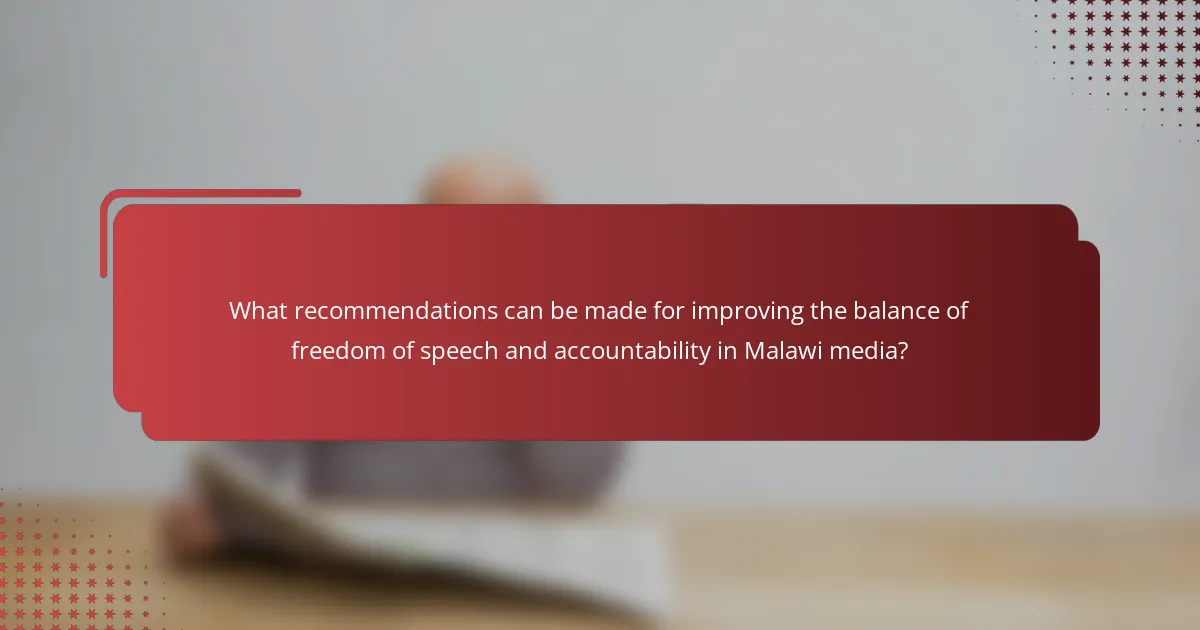
What recommendations can be made for improving the balance of freedom of speech and accountability in Malawi media?
Establishing clear legal frameworks is essential for balancing freedom of speech and accountability in Malawi media. These frameworks should define the limits of free expression while protecting journalists from undue censorship. Implementing media literacy programs can empower the public to discern credible information from misinformation. Encouraging self-regulation within media organizations can foster accountability without infringing on freedom of speech. Strengthening the role of independent media regulatory bodies can ensure fair oversight of media practices. Promoting dialogue between media professionals and government entities can enhance mutual understanding and cooperation. Supporting whistleblower protections can encourage reporting of unethical practices without fear of reprisal. Engaging civil society in discussions about media ethics can cultivate a culture of responsibility among journalists. These recommendations aim to create a media landscape that respects both freedom of expression and accountability.
How can policymakers support a more accountable media environment?
Policymakers can support a more accountable media environment by implementing robust regulatory frameworks. These frameworks should promote transparency in media ownership and funding. Clear guidelines on journalistic ethics can enhance accountability. Policymakers should also establish independent media regulatory bodies to oversee compliance. Encouraging public access to information strengthens media accountability. Providing training for journalists on ethical reporting is essential. Supporting mechanisms for public feedback can enhance media responsiveness. Finally, fostering partnerships between media organizations and civil society can improve accountability standards.
What legislative changes are necessary to protect journalists and media outlets?
Legislative changes necessary to protect journalists and media outlets include enacting laws that ensure freedom of expression. These laws should provide clear protections against censorship and harassment. Additionally, establishing legal frameworks for the safety of journalists is crucial. This includes laws that penalize attacks on journalists and ensure prompt investigations into such incidents.
Furthermore, reforms should address media ownership transparency to prevent monopolies that can stifle diverse voices. Implementing laws that support public access to information is also essential. This promotes accountability and empowers journalists to investigate effectively.
Lastly, creating independent regulatory bodies can help oversee media practices and ensure adherence to ethical standards. These changes can strengthen the media landscape and safeguard journalistic integrity in Malawi.
How can training and resources be improved for journalists in Malawi?
Training and resources for journalists in Malawi can be improved by implementing structured training programs. These programs should focus on investigative journalism, media ethics, and digital literacy. Partnerships with international media organizations can provide expertise and resources. Additionally, establishing mentorship programs can help less experienced journalists learn from seasoned professionals. Access to digital tools and technology is crucial for modern reporting. Funding from government and NGOs can support these initiatives. Regular workshops and seminars can keep journalists updated on best practices. Enhanced training will lead to more accountable and responsible journalism in Malawi.
What role does civil society play in promoting media accountability?
Civil society plays a crucial role in promoting media accountability by advocating for transparency and ethical standards in journalism. Organizations within civil society monitor media practices and hold media outlets accountable for misinformation or bias. They facilitate public discussions on media performance and encourage citizen engagement in media literacy. For example, civil society groups often conduct workshops to educate the public about critical media consumption skills. They also collaborate with regulatory bodies to influence policies that enhance media accountability. Research shows that countries with active civil society organizations tend to have more robust media accountability mechanisms. This underscores the importance of civil society in fostering a responsible media landscape.
How can citizen engagement enhance the effectiveness of media oversight?
Citizen engagement enhances the effectiveness of media oversight by increasing accountability and transparency. When citizens actively participate, they can hold media organizations responsible for their content. This involvement encourages media outlets to adhere to ethical standards and report accurately. For instance, public feedback can lead to corrections of misinformation. Additionally, citizen engagement fosters a culture of critical consumption of media. When individuals are informed, they can challenge biased narratives and demand better reporting. Research indicates that areas with high citizen involvement see improved media quality and trust. This correlation underscores the importance of citizen participation in media oversight.
What initiatives can be launched to encourage responsible media consumption?
Educational programs can be launched to encourage responsible media consumption. These programs can teach critical thinking skills regarding media content. Workshops can focus on identifying misinformation and understanding media bias. Community discussions can promote dialogue about responsible sharing practices. Collaborations with schools can integrate media literacy into the curriculum. Campaigns can raise awareness about the impact of media on public opinion. Partnerships with media organizations can provide resources for fact-checking. Research shows that media literacy initiatives can significantly improve critical consumption skills among audiences.
What practical steps can media organizations take to ensure accountability?
Media organizations can ensure accountability by implementing transparent editorial policies. These policies should outline standards for accuracy and fairness in reporting. Regular training for journalists on ethical practices is essential. Establishing a system for fact-checking can prevent misinformation. Media organizations should also create channels for audience feedback. This allows the public to voice concerns about content. Additionally, publishing corrections promptly builds trust. Collaborating with independent oversight bodies enhances credibility. Finally, conducting regular audits of media practices ensures ongoing compliance with accountability standards.
How can media outlets implement internal checks and balances?
Media outlets can implement internal checks and balances by establishing editorial guidelines and review processes. These guidelines should clearly define standards for reporting accuracy and ethical conduct. Regular training sessions can reinforce these standards among staff. Additionally, creating an independent editorial board can provide oversight and accountability. This board can review contentious content before publication. Implementing a whistleblower policy encourages employees to report unethical practices without fear of retaliation. Regular audits of content and processes can identify areas for improvement. Transparency in decision-making fosters trust with the audience. By adopting these measures, media outlets can enhance their credibility and uphold journalistic integrity.
What strategies can be adopted to foster transparency in reporting?
Adopting clear guidelines for reporting fosters transparency. Establishing a code of ethics helps journalists understand their responsibilities. Regular training on ethical reporting practices reinforces these guidelines. Implementing fact-checking protocols ensures accuracy in reporting. Encouraging open communication between reporters and sources builds trust. Utilizing technology for data verification enhances reporting integrity. Publishing sources and methodologies increases accountability. Engaging with the audience for feedback promotes a transparent dialogue.
The primary entity of this article is the media landscape in Malawi, focusing on the balance between freedom of speech and accountability. Key issues examined include government censorship, lack of legal protections for journalists, and political interference that undermine media independence. The article discusses how cultural and political contexts influence media freedom, highlights historical events shaping the current media environment, and presents notable case studies illustrating these challenges. Additionally, it offers recommendations for improving media accountability, including legislative changes, training for journalists, and strategies for fostering transparency in reporting.
